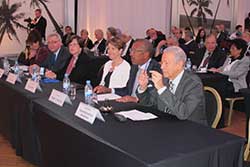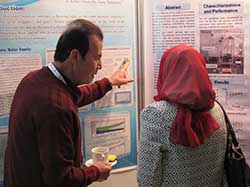The Malta Conferences
Frontiers of Science: Research and Education in the Middle East
Morton Hoffman and Zafra Lerman
Yousef Abu Mayla (Al-Azhar University, Gaza, Palestinian Authority) explaining his poster on "Water Situation in the Gaza Strip 2015."
Distinguished guests: (from the right) Rachid Benmokhtar Benabdellah, Minister of National Education and Vocational Training, Morocco; Dwight L. Bush, Sr., U.S. Ambassador to Morocco; Karen Betts, U.K. Ambassador to Morocco; Anne Vasara, Finland Ambassador to Morocco; Are-Jostein Norheim, Norway Ambassador to Morocco; Fadila Boughanemi, European Commission of the E.U. Not in the picture: Donna Nelson, ACS President-elect.
With the terrorist massacres in Beirut and Paris, the ongoing killings in Israel and the West Bank, and the encroachment of ISIS into the area as the immediate backdrop, the seventh biennial Malta Conference (Malta VII) on research and education in the Middle East was held at the Sofitel Hotel in Rabat, Morocco, on November 15-20, 2015.
The six previous Malta Conferences were held in Valletta, Malta (2003, 2005, 2013), Istanbul, Turkey (2007), Amman, Jordan (2009), and Paris, France (2011 at UNESCO headquarters as part of the celebration of the International Year of Chemistry). The Malta Conferences Foundation (MCF), a 501(c)(3) charitable organization incorporated in Washington, DC, organizes the Conferences and raises money for their support.
The continuing horrifying events within the Middle East and around the world provoked an increased determination to the more than 90 participants at Malta VII to unite with one another to build collaborations as a bridge to peace. With scientists and science educators from universities and national institutes, including students and early-career scientists, from 15 Middle East and North Africa (MENA) countries (Bahrain, Egypt, Iran, Iraq, Israel, Jordan, Kuwait, Lebanon, Morocco, Palestinian Authority, Qatar, Saudi Arabia, Syria, Turkey, and the United Arab Emirates), as well as speakers and conference organizers from U.S. and Europe, the Conference featured plenary lectures by four Nobel Laureates, workshops on topics of importance to the participants from the region, oral and poster presentations, and ample time for everyone to make personal and professional connections.
Amazingly, given the declared and undeclared states of war and political animosities among the MENA countries, only one person, a representative from Libya, was denied a visa to enter Morocco. Even the Syrians and Iraqis, who received their visas on the day before the Conference was to begin, managed to come and tell us first-hand about the hardships they encounter on a daily basis in order to maintain their scientific research as well as the obstacles they faced in order to travel to Morocco.
The plenary lectures were given by the following Nobel Laureates: Ada Yonath (Israel, 2009), Borderless Science; Dan Shechtman (Israel, 2011), Technological Entrepreneurship, Key to World Peace and Prosperity; Roald Hoffmann (U.S., 1981), Two New Games for Carbon; Martin Karplus (U.S., 2013), Motion: Hallmark of Life From Marsupials to Molecules.
Presentations were also made by Yvonne Pope (Chemical Abstracts Services, U.K.), SciFinder – The Choice for Chemistry Research; Olli Vuola (Aalto University, Finland), Entrepreneurship and Innovation; Nicholas Anthis (U.S. Agency for International Development), The Middle East Regional Cooperation (MERC) Program; Leiv Sydnes (University of Bergen, Norway), Chemical Safety and Security; Jonathan Forman (Organization for the Prohibition of Chemical Weapons, The Netherlands), Educational Resources From OPCW; Fadila Boughanemi (European Commission on Research and Innovation, E.U.), Builds Bridges Through Science Diplomacy; Mohamed Ismail (Ain Shams University, Egypt), Software Demonstration of Molecular Modeling and Computer Aided Drug Design; Donna Nelson (President-Elect, American Chemical Society), The Science Behind “Breaking Bad.”
Greetings were offered at the opening ceremony by Zafra Lerman (President, MCF), Rachid Benmokhtar Benabdellah (Minister of National Education, Morocco), Dwight Bush, Sr. (U.S. Ambassador to Morocco), Karen Betts (U.K. Ambassador to Morocco), Anne Vasara (Finland Ambassador to Morocco), Are-Jostein Norheim (Norway Ambassador to Morocco), Lahcen Haddad (Minister of Tourism, Morocco), Fadila Boughanemi, and Donna Nelson. Evening receptions were held during the week at the residences of Ambassadors Bush, Vasara, and Norheim. The Moroccan Ministry of National Education, the Academy of the Kingdom, and the Hassan II Academy of Science and Technology hosted a farewell cocktail dinner.
The following multi-session workshops, which were chaired by the listed organizers, were held:- Organic, Organo-metallic, and Medicinal Chemistry: Cathy Costello (U.S.), Masoud Mehrgardi (Iran), Mohammed El-Khateeb (Jordan)
- Energy, Materials, and Nanotechnology for Resource Sustainability: Marwan Mousa (Jordan), Ron Naaman (Israel), Pierre Karam (Lebanon)
- Environment: Air and Water Quality: Chuck Kolb (U.S.), Abdelrahman Alamarah Tamimi (Palestinian Authority), Abdallah Husein Malkawi (Jordan), Yossi Guttman (Israel)
- Science and Technology Education: Rachel Mamlok-Naaman (Israel), Morton Hoffman (U.S.)
A total of 54 oral presentations were made during the workshop sessions; 21 posters were on display throughout the entire meeting. At the end of the conference, the workshop organizers provided summaries of the talks and discussions in their sessions. Proposals were presented for future actions, including the continuation of existing collaborations on water and education, and the development of new ones, the dissemination of the information from the workshops to a broader audience, and the search for funding to provide research and international exchange opportunities for students and faculty. In the closing session, the participants, many of whom had attended previous Malta Conferences, enthusiastically endorsed the motion that Malta VIII be held in 2017.
The members of the MCF Board of Directors who attended Malta VII were Zafra Lerman (President, U.S.), Ann Nalley, (Vice President, U.S.), Iona Black (Secretary, U.S.), Morton Hoffman (Treasurer, U.S.), Cathy Costello (U.S.), Chuck Kolb (U.S.), Leiv Sydnes (Norway), and Hassan Bazzi (Qatar).
The following organizations were co-sponsors of Malta VII:- Carnegie Foundation of New York
- Organization for the Prohibition of Chemical Weapons (OPCW): Recipient of the 2013 Nobel Prize for Peace
- Rockefeller Brothers Fund
- Wiley Rein LLP
- Korea Chemical Industry Research Group (KCIRG)
- United Nations Educational, Scientific and Cultural Organization (UNESCO)
- Committee of Concerned Scientists (CCS)
- American Chemical Society (ACS)
- ACS Division of Chemical Education (CHED)
- American Association for the Advancement of Science (AAAS)
- Terrific Science
- Alexander von Humboldt Foundation
More information about MCF and the Malta Conferences can be found at
Zafra Lerman is President and Morton Hoffman is Treasurer of the Malta Conferences Foundation. Lerman is the winner of the APS Sakharov Prize for 2016.


